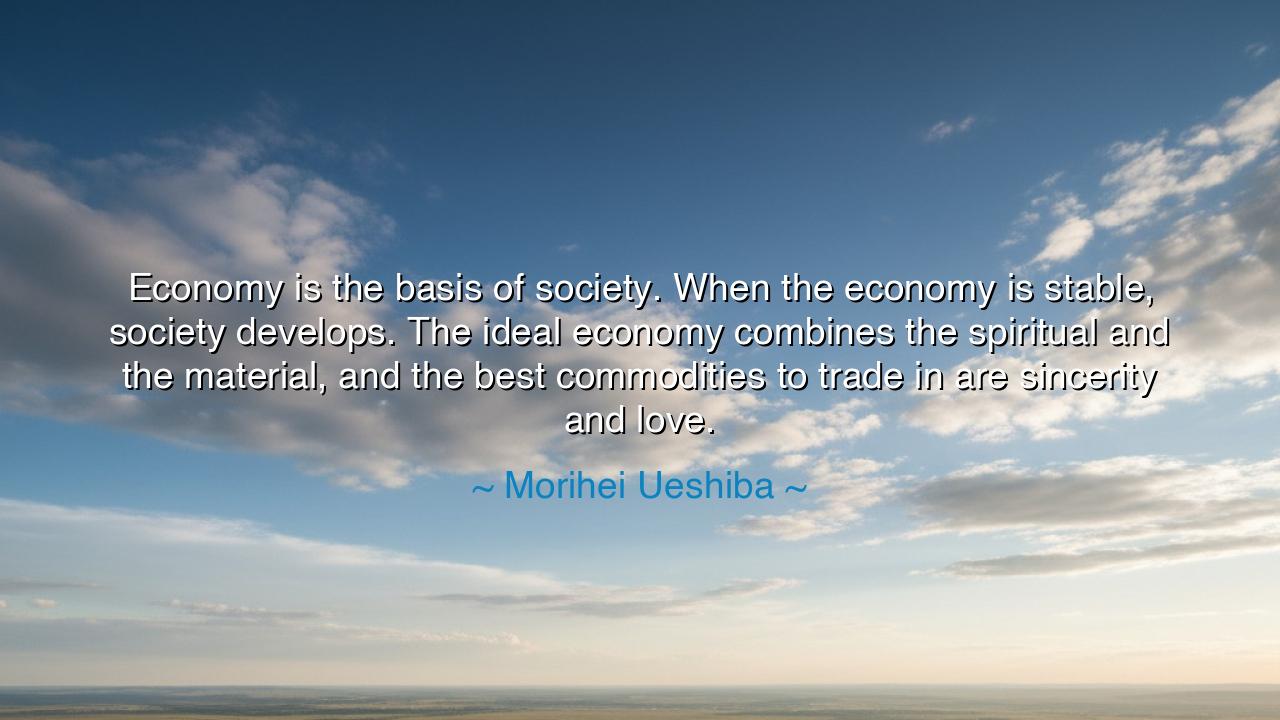
Economy is the basis of society. When the economy is stable
Economy is the basis of society. When the economy is stable, society develops. The ideal economy combines the spiritual and the material, and the best commodities to trade in are sincerity and love.






Hear the profound words of Morihei Ueshiba, master of harmony and founder of Aikido: “Economy is the basis of society. When the economy is stable, society develops. The ideal economy combines the spiritual and the material, and the best commodities to trade in are sincerity and love.” These are not the calculations of a merchant, nor the strategies of financiers, but the wisdom of a sage who saw that the flow of wealth is not merely about coin and commerce—it is about life itself, about balance between body and spirit, between survival and compassion.
From the dawn of civilization, men and women have known that economy sustains society. The granaries of Egypt filled with grain, the markets of Athens bustling with trade, the caravans of the Silk Road carrying treasures across the world—these became the arteries of nations. When the harvest was good and trade was fair, people flourished. When famine or corruption struck, kingdoms fell. Thus Ueshiba speaks rightly: when the economy is stable, society develops, for stability gives birth to learning, art, justice, and peace.
Yet Ueshiba goes beyond the common wisdom of rulers and economists. He declares that the ideal economy is not one of numbers alone, but one that combines the spiritual and the material. For wealth without virtue is ruin, and prosperity without compassion is empty. The ancients told this truth in parables: King Midas turned all to gold and starved; the merchant who hoarded treasure gained the world but lost his soul. Ueshiba reminds us that an economy is not only measured in goods, but in the spirit with which men exchange them.
Consider the story of Mahatma Gandhi, who urged the spinning of cloth in India. His movement was not only economic but spiritual: to free the people from dependence on colonial industries and to return dignity to the work of their own hands. Gandhi understood, like Ueshiba, that the economy must honor both body and spirit. Without the material, the people suffer. Without the spiritual, they lose their soul. It is only in their union that a society is both strong and just.
And what are the best commodities to trade in? Not jewels, nor spices, nor the fleeting wealth of silver and gold. Ueshiba teaches that they are sincerity and love. For what use is a marketplace where men lie, cheat, and exploit? Such a market devours itself. But where sincerity reigns, trust grows; where love guides trade, communities prosper. The greatest wealth is not measured in vaults, but in relationships forged through truth and compassion. Nations that forget this may gain riches but lose their humanity.
The lesson is clear: each of us participates in the great economy of life. In every word spoken, in every act of work, in every exchange with another, we are trading something. If we trade in greed and deception, we poison the society we live in. But if we trade in honesty, kindness, and goodwill, we enrich not only ourselves but all who dwell within our circle. This is the true basis of society, greater even than coin: the daily commerce of hearts.
Therefore, O listener, take this wisdom into your life: do your work with integrity, share your wealth with compassion, and let every exchange you make—be it of goods, words, or deeds—be marked with sincerity. Remember always that prosperity is not complete without humanity, and that stability of society depends upon both the bread that feeds the body and the love that feeds the soul.
And so let Ueshiba’s words be engraved in our memory: “The ideal economy combines the spiritual and the material, and the best commodities to trade in are sincerity and love.” For when we honor this union, we build not only wealth, but a society of harmony, peace, and enduring strength—an economy of the spirit, as well as of the earth.






AAdministratorAdministrator
Welcome, honored guests. Please leave a comment, we will respond soon